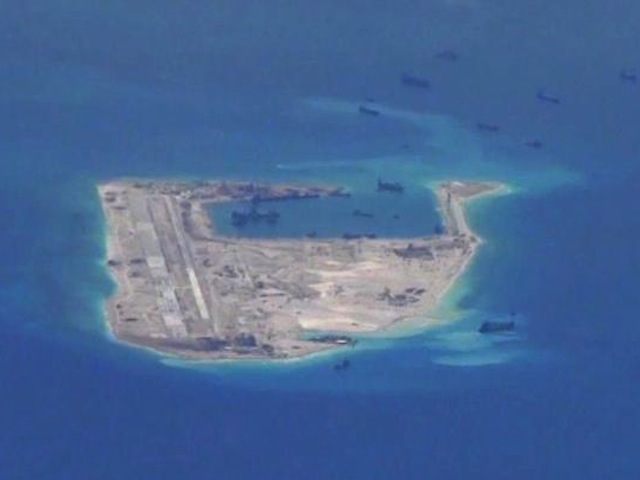The Chinese government is fighting off protests from American officials that it landed a military plane on Fiery Cross Reef, a disputed territory both Vietnam and the Philippines claim, alleging the flight was necessary to save a worker having a medical emergency.
On Sunday, China landed a Y-8 navy patrol plane on the artificial island it built on Fiery Cross Reef in the Spratly Islands, allegedly to transport a severely ill Chinese national to the mainland for medical care. It is the first time China has sent military aircraft to the island, though it has flown civilian aircraft there in the past.
American officials have reacted to the move with skepticism. “We’re aware that a Chinese military aircraft landed at Fiery Cross Reef on Sunday in what China described as a humanitarian operation to evacuate three ill workers. It is unclear why the Chinese used a military aircraft, as opposed to a civilian one,” Pentagon spokesman Capt. Jeff Davis told CNN on Monday.
“We urge China to reaffirm that it has no plans to deploy or rotate military aircraft at its outposts in the Spratly’s [sic], in keeping with China’s prior assurances,” Davis concluded to CNN.
The Chinese government has responded with harsh criticism of the United States, alleging it is America that is militarizing the South China Sea despite China’s years-long attempt to colonize a region known as the nine-dash line, a part of the South China Sea featuring claims by Vietnam, the Philippines, Brunei, Taiwan, and Malaysia. No nation has publicly supported China’s claims in the region, and the Permanent Court of Arbitration is expected to soon decide on a case brought by the Philippines against China regarding these claims.
China has vowed to disregard any international legal verdict regarding the South China Sea.
“As we all know, the participation of military planes in disaster relief, humanitarian assistance and evacuating civilians is a common practice around the world,” Foreign Ministry spokeswoman Hua Chunying said of the incident on Fiery Cross Reef Sunday. “Rescuing the people in danger is a fine tradition of the People’s Liberation Army. … When people’s lives are at risk, the U.S. is still obsessed with questioning whether a military or civilian plane should be the choice.”
The Chinese Foreign Ministry additionally issued a statement accusing the U.S. of creating “the so-called tensions” in the region “with their own political agenda.” The Ministry asserted:
Just a day before yesterday, the US ambassador to the Philippines said the US will offer surveillance airships and other military equipment worth of 42 million US dollars to the Philippines. The truth is that if there are any tensions in the South China sea, the US is the biggest factor.
The Chinese state news outlet Xinhua also published an editorial condemning the United States for questioning the presence of Chinese military aircraft on disputed territory. “Washington’s suspicion is needless and baseless,” the article reads, reasserting the universally rejected claim that “China has indisputable sovereignty over the Nansha [Spratly] Islands and its surrounding waters. It is lawful for a Chinese plane to fly in China’s own airspace and the United States has no right to criticize such a move.”
China has previously sent aircraft to Fiery Cross, but only civilian jets. In January, Vietnam, the Philippines, and Japan all condemned the presence of a Chinese jet on the artificial island. “Vietnam resolutely protests China’s above-mentioned action, asking China to immediately end while not repeating similar move,” Vietnamese Foreign Ministry spokesman Le Hai Binh said at the time. “Fiery Cross or Kagitingan Reef is part of our Kalayaan Island Group,” Filipino Department of Foreign Affairs Spokesman Charles Jose responded.
China claimed the flight was a test of a newly built landing strip. Less than a week later, it landed two more planes on the same landing strip. The Vietnamese Foreign Ministry once again objected.
“To begin flight operations at this new airfield in a disputed area raises tensions and threatens regional stability,” U.S. State Department spokesman John Kirby said at the time.

COMMENTS
Please let us know if you're having issues with commenting.